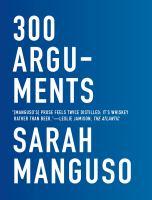
Here at Johnson County Library we're always on the lookout for insightful words about writing. Sarah Manguso's latest book, 300 Arguments, contains quite a few. At its most basic level, the book is a collection of aphorisms. And, since Manguso is a professional writer and writing teacher, some cover that topic. Here are a few to mull over:
Nothing is more boring to me than the re-re-restatement that language isn't sufficiently nuanced to describe the world. Of course language isn't enough. Accepting that is the starting point of using it to capacity. Of increasing its capacity.
-----
I don't love writing; I love having a problem I believe I might someday write my way out of.
-----
My least favorite received idea about writing is that one must find one's voice, as if it's there inside you, ready to be turned on like a player piano. Like character, its very existence depends on interaction with the world.
-----
Biographies should also contain the events that failed to foreshadow.
-----
In real life, my healthy boyfriend said that he envied my paralytic disease--that I'd earned the right to a legitimate nervous breakdown. A few years later he was in an accident and became paralyzed from the neck down. That's just bad writing.
-----
Of a page of perfect prose I read in a dream, I remember only this: "Thank you," she said. Her simple answer concealed the truth.
-----
The fastest way to revise a piece of work is to send it, late at night, to someone whose opinion you fear. Then rewrite it, praying you'll finish in time to send a new version by morning.
-----
Just before the poetry reading starts, I ask the overgrown boy sitting next to me why he likes poetry, what happened to him, and he says, I went to war.
-----
It takes x hours to write a book and some percentage of x to wish I were a different writer, writing a different book.
-----
I like writing that is unsummarizable, a kernel that cannot be condensed, that must be uttered exactly as it is.
There are others, too many to share here.
300 Arguments has more value than as a collection of Manguso's random thoughts about writing, though. It also demonstrates a unique approach to telling a story. For there is more to the book than haphazardly cataloged, pithy insights into life. A careful reading reveals a fuzzy portrait of a person. This may not necessarily be an approach for other writers to imitate, but it is surely one that can instruct in unexpected ways.
Here is a review:
One of the aphorisms from the middle of 300 Arguments reads:
Think of this as a short book composed entirely of what I hoped would be a long book's quotable passages.
And they are that, quotable. Reflections, insights, memories that each capture some truth about life. They are aphorisms, each a self-contained, poetic, miniature essay.
I used to write these while playing hooky on what I hoped would be my magnum opus. Assigning myself to write three hundred of them was like forcing myself to chain-smoke until I puked, but it didn't work. I didn't puke.
Yet, while they are each self-contained and complete, they are arranged in a sequence that tells a story. They are dots that can be connected to get a sense of a person behind them. While some are purely general,
Shame needs an excuse to feel ashamed. It apologizes for everything, even itself.
others convey common experiences with specific memories,
In ninth grade I was too afraid to speak to the boy I loved, so I mailed him a black paper heart every week for a year. I wasn't afraid of him; I was afraid of my feeling. It was more powerful than God. If we'd ever spoken it might have burned the whole place down.
and still others simply capture personal moments and feelings:
The most fervent kiss of my life was less than five seconds long more than ten years ago with someone else's husband. It still hasn't quite worn off.
Most are confessional on at least some level, particularly when connected with those surrounding them. Many echo, complement, and supplement previous thoughts from different perspectives. Themes emerge: desire, loss, ambition, writing, intimacy, vulnerability, suffering, marriage, parenthood, and mortality among them.
A person emerges: a passionate artist who has succeeded on at least some level as a writer, who has experienced many relationships before finding contentment in becoming a wife and mother, who has struggled with chronic illness, and who is reflecting on all of it from the perspective of a premature, voluntary end of life.
It is a book that asks if unfulfilled yearning is enough, in and of itself.
There were people I wanted so much before I had them that the entire experience of having them was grief for my old hunger.
And it is a book that hints at the hints of fulfillment a particular person has found.
And it accomplishes all of that in a spare, minimal, efficient, and original manner. It is quite a writing feat.
On the page, these might look like the stones of a ruin, strewn by time and weather, but I was here.
